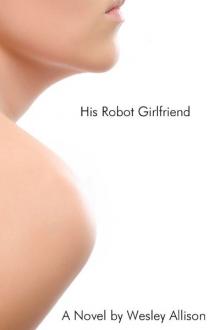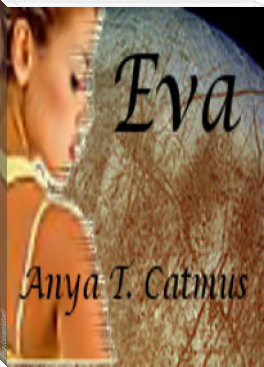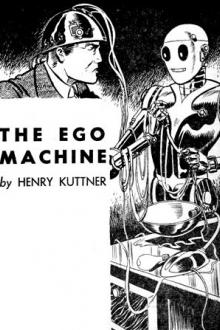The Boy Who Fell from the Sky - Jule Owen (english love story books TXT) 📗

- Author: Jule Owen
- Performer: -
Book online «The Boy Who Fell from the Sky - Jule Owen (english love story books TXT) 📗». Author Jule Owen
Thunder shakes the tree, and then rain is beating down all around him, bouncing off the shiny leaves. He notices a bank of moss growing on the side of a thick branch, scrapes off a handful and holds it in the rain until it’s sodden, then presses it against his shoulder.
He finds a way to lie down securely without danger of falling from the tree and rests there miserably, the rain pounding down, relentless. When it finally stops, he cranes his neck over the side of his refuge. The cat has gone, but night is closing in, and he’s too tired to go down and gather things to make a decent bed. He sleeps fitfully where he is, his shoulder throbbing.
Sunday, 19 June 2472, Siberia
In the morning, there’s no sign of the cat. He lets himself down and goes to the river to drink. His arm aches. At the water’s edge he takes off his shirt and examines his shoulder. There’s a large gash, red and gaping. He cleans it in the river, then gathers some more moss, and tears a strip off his shirt to bind the wet moss to his wound. His shirt is now in tatters. He considers putting it back on and then ties it around his head to keep off the sun and catch the sweat that constantly drips down his face.
He spends a long time searching for food in the forest, distracted by the wound inflicted by the cat. The day before, he left his walking pole on the bank of the river and moving in the undergrowth is harder without it. Hunting around, he finds another buried in a tangle of sticky clinging vines and low broad-leafed growth. As he pulls it carefully from the leaves, he thinks about snakes and spiders. This new stick is a better one. He sizes it, balancing it in his good hand. His other arm is throbbing, and his skin is stained with his own blood, but he tries to put that from his mind.
Heading to the river, he hears an animal noise, a growl, coming from across the water, but it isn’t close enough for him to be sure it’s the cat. He scans around for a tree to climb, but he is in amongst small shrubs and banana trees. Taking another route, he walks deeper in the forest for a while, until finally he turns again towards the river and hears the cat, distinctly this time. He’s forced to retreat, trying to stay parallel to the river from a distance.
The river is his compass, and he doesn’t want to lose it.
As the day goes on and he gets thirsty, he wonders how he can find clean, fresh water. Searching amongst the low-growing plants, he finds one whose centre is full of rainwater. Cautious, he tastes a small amount first, worried the plant might have poisoned it, but the water is sweet and clean, better than the river water. When he’s finished drinking, he examines his bandage and thinks about washing the wound in the water, but when he touches the moss, the pain is so bad he decides to leave it alone.
The ground is becoming stony, and he realises he’s climbing and getting further away from the river. Straining his ears, he can no longer hear the rushing sound of the water. He clambers across a rocky outcrop on the side of the hill, bare of plants, and, standing on a boulder, takes a breather and surveys his whereabouts. Down below the treetops the river gleams silver in the sunlight. He sighs with relief. It looks like if he walks down at a diagonal, he’ll meet the river, so he slides off the boulder and sets off again.
There are a few taller trees to use as landmarks and a rocky peak on the other side of the valley atop a flat-sided cliff next to the river. It’s hot. The sun burns without the shade of the forest. He arranges the hat he’s made with his shirt to cover his neck and shoulders. The large moon in the blue sky hangs over him.
He moves on quickly, starting off with purpose, but he hasn’t gone far when he hears a snapping of branches. The sound is close. The cat is walking through the undergrowth directly ahead.
Once again he searches frantically for somewhere to hide. He’s surrounded by tall trees, but they have straight, smooth trunks with no low branches to grip hold of. Striking a slightly different path, to his right, along the contour of the hillside rather than directly down, he glimpses a flash of the cat between the trunks of trees. It does not come directly at him but crosses his path, through the dense foliage ahead. It’s gone and then appears again, some way down the hillside.
It’s sitting. Waiting. It yawns.
He climbs slightly higher and tries to walk forward along the hillside again, but the cat is there.
Is it playing with me? he wonders. Cats do that with their food before they make a kill.
His pulse hammers away, but he doesn’t experience the rising panic he’s felt before in encounters with the cat, even though, this time, he seems to have nowhere to go. They continue. The cat, he realises, is pushing him higher up the mountain. It’s herding him. They climb. There are more and more rocks, fewer trees and shrubs. A high stone cliff rises above him, penning him in on the cliff side.
Is it taking me to the place it wants to kill me?
This is a game, he reminds himself. A highly realistic, rather horrifying game.
Then the mantra: This is not real. I cannot die.
He is at the base of the cliff. The cat has come from the forest. It’s standing in front of him. As he moves to go the other way, fluidly, free of the least effort, it moves into his path. In every physical way this animal is superior.
Carved into the cliff, there’s a cave. Its black mouth gapes at the daylight. The cat is weaving backwards and forwards now, pushing Mathew into the cave. This is where it brings its prey to die, he thinks.
The gunshot rings pure and clear, the sound bouncing off the cliff side and echoing down the canyon. The bullet was aimed at the cat. It misses and takes down a tree instead, which cracks and breaks and falls. The cat is gone in the blink of an eye. Air shudders in Mathew’s lungs. He breathes out.
He is saved.
There are men coming towards him.
19 Dragomirov
“Стой!”
A human voice. A foreign language but a human voice. Mathew doesn’t understand the words, but they have the international sound of a command. The game clearly doesn’t allow ordinary Nexus simultaneous translation. The sound of people approaching. Rocks disturbed, branches broken. Conversation. There’s an urgency and aggression to the exchanges that make Mathew think these people are not out on a Sunday stroll. The language is familiar, though. It sounds like Eva. It sounds like Russian.
They break through the trees and start climbing the rocky slope towards him. Four soldiers in jungle camouflage carrying strange-looking guns. Two of the soldiers have their crosshairs trained on him as they approach. Slowly, Mathew puts down his walking stick and puts his hands in the air.
“Как тебя зовут? Oткуда вы? Вы понимаете меня?”
The man who has spoken to him, and who appears to be in charge, indicates to the others to lower their weapons. Mathew feels only marginally safer when they do.
“Говорить!” snaps the man in charge. He has a blond crew cut, a two-day beard and the distinctive deep-set eyes of Russian people; he’s glistening with sweat, dark patches under his arms and across his chest.
“I don’t understand,” Mathew says. “I don’t speak Russian.”
The man smiles, clearly pleased, like he has found something he was searching for, like he has struck gold. He looks around at the other soldiers, who grin back at him, and then says to Mathew in heavily accented English, “You come with us.”
They walk for an hour at a military clip Mathew barely keeps pace with, down to the river and along the bank until they reach a broad rocky shore, like the one where the cat pounced on him. At the edge, on the river-smoothed stones, is a camp in a cleared area. There are shelters, tarpaulins stretched between posts, hammocks, equipment and supplies hanging from the beams of the shelters, a fire tended by another solider, the smell of food.
Mathew thirstily drinks clean, fresh water from a beaker offered to him by the crew-cut Russian who refills it for him from a hanging barrel fed from a water filter. He indicates to a makeshift bench made from forest wood. Mathew sits down. Crew-cut shouts at the man tending the fire. The man is fat, with curly greying black hair, the bulbous nose of a heavy drinker, a red face, and smiling dark eyes. He brings something to Mathew – a metal bowl, a spoon, food, some kind of stew. It smells amazing. Mathew delves in ravenously, unquestioning. It is food. It is hot. Crew-cut smiles at him indulgently, is patient, lets him eat.
The fat man watches him eat, too. “I am Evgeny, Evgeny Shukshin,” he says, touching his fingers to his chest. “Who are you?”
“Mathew,” he says between mouthfuls, spooning the last bits of gravy into his mouth. “You speak English?”
“Little bit,” the cook says, grinning. “I wish more.” The cook notices his shoulder. “You are hurting.”
Trying to escape the cat, meeting the Russians, Mathew has forgotten his shoulder, which has started to bleed again. The shirt and moss bandage are hanging off him.
“I hurt my arm. And my feet.” He puts the bowl on the floor, bends down and loosens the laces of his boots, slowly drawing out his feet, removing his filthy, sodden, blood-stained socks and picking off the wad of moss covering his weeping skin.
The cooks says something to crew-cut, who calls to another soldier who’s hanging water carriers on one of the tent poles. A young man with a shaven head and a missing front tooth comes and takes hold of Mathew’s arm. He flinches. Gap-tooth says something to Evgeny.
Evgeny says, “It’s okay. He will help you.”
Mathew nods and turns to the soldier, who’s looking at him expectantly.
“Okay.”
Gap-tooth unwinds the remains of the makeshift bandage and picks away the moss. Mathew turns away and grits his teeth. The soldier whistles, goes to one of the hanging bags and comes back with a medical kit. Rummaging inside, he pulls out a tub, removes the top, and squeezes a transparent cream directly onto the wound. Then he sets to work pulling the wound together and binding the skin with adhesive strips. He wraps the whole thing in a clean bandage and then a waterproof dressing; he then turns his attention to Mathew’s damaged feet.
“Thank you,” Mathew says.
“Cпасибо,” Evgeny says to Mathew. “It’s thank you in Russian. Spaz iba.”
“Spaziba,” he repeats back to Evgeny.
The soldier grins and says something. Evgeny translates. “He says you’re welcome.”
Another, older man holding a telephone receiver attached to a box speaks to crew-cut, who gets up, takes the receiver, and starts speaking into the receiver in Russian, looking at Mathew.
The cook stays with him, offering him more food and water. No one points a gun at him now.
After he has eaten, Evgeny gives him soap and nods at the river. “You smell bad.





Comments (0)